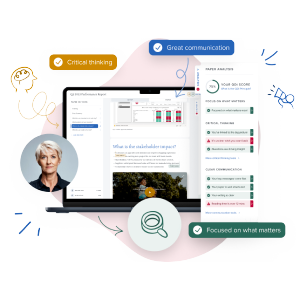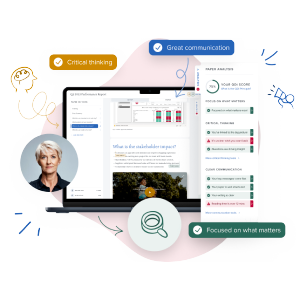Any board member will tell you “A successful board meeting starts long before we meet in the boardroom”. So you’d think board members are laser-focused on their priorities and making every minute count. Yet, any board member will also tell you that’s usually not the case: data indicates barely one-third of boards operate with clear priorities in mind.
So why does it happen, and what does it mean for boards?
What’s the cause?
In a world where the phrase ‘pale, male, and stale’ still rings true for many boards, their meetings also remain unchanged, often driven by habit and convention. Rather than starting from scratch each time a meeting is planned, too many boards have instead begun copying and pasting agendas from the last meeting or this time last year — thus entrenching past mistakes.
“We would use our time better if we abandoned the ‘high church’ rituals. Wasting the first half an hour reviewing minutes and matters arising does little to set the scene for a rich debate.”
~ Sir Kenneth Olisa OBE, CStJ, FRSA, FBCS, Lord-Lieutenant of Greater London
To compound matters, the breadth and complexity of topics boards must now consider have expanded [Paywall], but their agendas haven’t. While the majority of directors (78%) complain of an increase in compliance and regulation on board agendas, research shows meeting time has remained the same. Something else has to be squeezed out. That something is often important strategic debate.
Indeed, when you consider the split between steering and supervising — the two fundamental roles of any board — boards spend two-thirds of their time on supervisory discussions. But when board members are asked why they became a director, we hear it’s the opportunity to guide the company’s strategy and create real change. I doubt many became a NED to spend time looking backwards, monitoring, and seeking assurance the executives are doing as planned. Unsurprisingly, then, nearly half of the boards we surveyed would like to find more time to discuss strategy.
What can be done?
So, if board members aren’t happy with the status quo, the question becomes: What can be done about it? Here’s what we suggest:
- Break with the habit and convention of your agenda structure and don’t fall into the trap of copying and pasting a prior meeting;
- Think from first principles about how you want to use your time;
- Be ruthless about what comes first and what is going to be squeezed around the edges.
1. Leave bad habits behind
Models such as the ‘Board Intelligence Six Conversations’ enable you to proactively plan how you balance your time between steering and supervising, and across strategy, performance, and governance. Start with your organisation’s priorities and where they sit within this model and on your agenda. These items should be tackled at the start of meetings — when the board is fresh and time is plentiful. The more regular or routine items can then be fitted around them. This will refocus board time on strategic debate and avoid one of the many jobs of the board becoming the board’s only job.
2. Readdress where you spend your time
The ‘Jar of Life’ is a great analogy to help you be ruthless about time. In our version of the Jar of Life, the large ‘rocks’ are the key papers on important steering priorities, significant decisions, and scheduled supervisory deep dives. The ‘sand’ — which previously dominated the agenda — is the regular and routine items: monthly or quarterly performance reports and compliance and regulatory items, for example.
Begin by identifying the rocks, and add those to the jar (or agenda) first. Then, add the sand, but be ruthless and challenge yourself whether any sand can be removed, delegated, or reduced in frequency. After the rocks and the sand, the jar should have headroom for the ‘pebbles’ — ad hoc papers in response to things that crop up over the course of the year that you can’t plan for. This may sound simple, but when applied to your agendas it can transform your meetings.
Once you’ve defined your agendas, cross-check this matches with your initial objectives of how you want to weigh your time over the year. Be wary of busy, spreadsheet-based forward planners. If you can’t easily visualise where you’re spending your time, how can you be sure this matches your organisation’s objectives and that the board is adding the desired value?
3. Think beyond the boardroom
The key to freeing up your meeting time for what really matters is to prioritise and plan — it’s a case of taking time to make time. This exercise won’t just benefit directors: any time the board spends sharpening its agendas will make the Secretariat’s life much easier in turn.
Planning agendas across an interconnected lattice of committees, management forums, and board meetings can be a mammoth task. Consumed by administration and juggling Word and Excel documents with constant updates and new versions, there is little or no time for the Secretariat to advise the board on whether the content of the agenda really is focused on the right priorities and strategic items. That balance needs to be re-struck to ensure the Secretariat is operating as adviser rather than PA to the board.
What’s the impact?
“This has changed the way we talk about our business in the boardroom.”
~ Steve Holliday, CEO, National Grid
A staggering 51% of boards don’t provide feedback on agendas and lie victim to poor habit and convention. Given investor, regulatory, and societal pressures for boards to do more and better fulfil their duties, the time to re-focus your agendas is now.
Learn more about Board Intelligence Agenda Planner
At Board Intelligence, we help leaders drive the best possible outcomes for their organisations and wider society. Our platform lets them concentrate time on what’s important and make sure it aligns to their purpose, goals, and underlying business drivers.
We’ll be introducing a host of new, priorities-related features this year, starting with Priorities Planner. Learn more about the new Priorities Planner.





